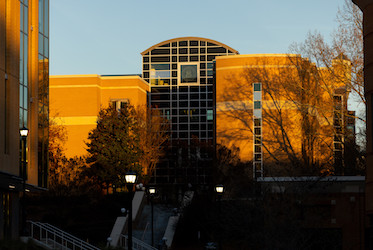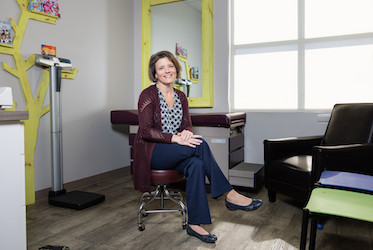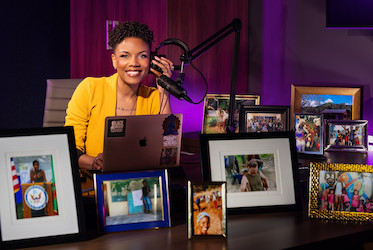
Showcasing Research
KENNESAW, Ga. | Apr 20, 2018
Symposium of Student Scholars attracts highest number of presenters in its 23-year history
Steven Ho was inspired to help fight cancer by seeing friends battling the disease, and he began attending Kennesaw State’s annual Relay for Life even before he became a student at the University.
Now a junior biology major at KSU, Ho has added the role of cancer researcher. Ho is working with professors Jonathan McMurry and Julia LeCher on research that potentially could result in new medical treatments to help fight cancer.
Ho presented his research Thursday at Kennesaw State’s Symposium of Student Scholars, an annual showcase of student scholarship conducted during the past academic year. He was among the 441 students presenting 280 projects, the highest numbers in the symposium’s 23-year history.

The research involves “stressing out a cell” so that a particular protein moves from the cytoplasm to the mitochondria, causing the cell to die, Ho explained. Essentially, the cell would kill itself off and no longer be cancerous. So far, the research team has been able to prove that they can get their protein inside the cell using cell-penetrating peptides, but they still need more data to conclude whether or not the process works.
“What draws me into research is being the first to do something,” Ho said. “It’s a major challenge in research to produce results because no one else is doing the kinds of things that I’m doing. I can work for an entire semester and still have no results. But once something finally works? It’s kind of amazing.”
Jake Massengill, a senior majoring in systems and industrial engineering, combined two of his interests – cybersecurity and nuclear engineering – to investigate the cybersecurity of nuclear power plants in the United States. He was able to determine that U.S. nuclear power plants are well defended from cyberattacks, but still face security threats such as supply chain attacks, uncertainty created by complex networks, and insecure control systems.
“This research allowed me to exercise the tools and skills I have learned from my major, which allowed me to highlight the uniqueness of my degree,” Massengill said. “I discovered that cyber threats are constantly evolving and changing, necessitating improvement in plant security. Static defenses are no longer sufficient to protect against modern cyber attackers.”
Several of the students presenting at this year’s symposium, including Ho and Massengill, also attended the National Conference on Undergraduate Research (NCUR) in Oklahoma earlier this month. Their wide range of research topics include:
- Dylan Carter: “Fairytales and human trafficking” – Carter’s performing arts project questions traditional fairytales wherein a princess is rescued by a prince or a girl is given away by her father. He concludes that the patriarchy and subjugation of women within fairytales plays a part in the global oppression and trafficking of women and girls.
- Hannah Carter: “Defining ‘healthy’: Changing food trends over the past 150 years” – Carter assessed food trends through the years, including the introduction of the first food store, the beginnings of vegan food, frozen food and genetically modified food, reliance on counting calories and the rise of vegetarianism, and found that history often repeats itself in how society defines “healthy eating.”
- Emma Evans: “Gender differences in STEM courses at KSU” – Evans is studying whether female students at Kennesaw State are less likely to feel that they belong in STEM (science, technology, engineering and math) fields than their male counterparts, and the causes and impacts of that perception. Responses to the survey will be compared with data on gender ratios in STEM departments.
- Karen Perdue: “An analysis of the efficacy of substance abuse intervention programs” – Perdue evaluated national substance abuse intervention programs and determined that success is most likely when these factors are present: non-traditional curriculum, such as encouraging physical activity; peer support groups; situational re-enactments; and the acquisition of resistance and coping skills.
In addition, a panel of judges selected the oral and poster presentations at this year's symposium to receive nine prize awards ranging from $100 to $500.
“The Symposium of Student Scholars is my favorite day of the year,” said Amy Buddie, the University’s director of undergraduate research. “It is truly amazing to see the breadth of student research that happens at KSU. I saw many of these students present their research at NCUR, and I can say without hesitation that our students rank among the best in the nation.”
Kennesaw State will host next year’s National Conference on Undergraduate Research on April 11-13, 2019. More than 4,000 students from 400 colleges and universities attended this year’s NCUR hosted by the University of Central Oklahoma.
– Paul Floeckher
Photos by David Caselli
Related Stories
A leader in innovative teaching and learning, Kennesaw State University offers undergraduate, graduate and doctoral degrees to its more than 45,000 students. Kennesaw State is a member of the University System of Georgia with 11 academic colleges. The university’s vibrant campus culture, diverse population, strong global ties and entrepreneurial spirit draw students from throughout the country and the world. Kennesaw State is a Carnegie-designated doctoral research institution (R2), placing it among an elite group of only 7 percent of U.S. colleges and universities with an R1 or R2 status. For more information, visit kennesaw.edu.


















